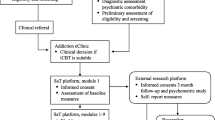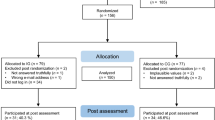Abstract
The aim of this study was to investigate the efficacy of an Internet-based cognitive behavioural therapy program (I-CBT) for the treatment of problem gambling, when compared to a waitlist control and an active comparison condition consisting of monitoring, feedback, and support (I-MFS). Participants (N = 174) were randomly allocated to the three conditions. Variables of interest were gambling outcome and related mental health measures. Participants in the active conditions (I-CBT and I-MFS) completed six online modules. Both I-CBT and I-MFS conditions resulted in significant treatment gains on gambling severity. However, I-CBT was also associated with reductions in a range of other gambling-related and mental health outcomes. Compared with I-MFS, I-CBT produced greater effects across seven outcomes measures, relating to gambling urges, cognitions, stress, and life satisfaction. I-CBT participants also rated the program as significantly more satisfactory. Treatment gains observed for both active conditions were found to be stable through to 12 month follow up. The results indicate that the benefits of I-CBT were more than simply the non-specific effects of engaging in online treatment or receiving motivation, feedback, and support. Online treatments for gambling may be a valuable tool in increasing help-seeking and treatment engagement in this population, and be integrated as part of stepped care approaches to treatment.

Similar content being viewed by others
References
American Psychiatric Association. (2000). Diagnostic and Statistical Manual of Mental Disorders: DSM-IV-TR (4th ed.). Washington, DC: American Psychiatric Publishing.
Carlbring, P., Degerman, N., Jonsson, J., & Andersson, G. (2012). Internet-based treatment of pathological gambling with a three-year follow-up. Cognitive Behaviour Therapy, 41(4), 321–334.
Carlbring, P., & Smit, F. (2008). Randomized trial of internet-delivered self-help with telephone support for pathological gamblers. Journal of Consulting and Clinical Psychology, 76(6), 1090.
Carver, C. S. (1997). You want to measure coping but your protocol’s too long: consider the brief COPE. International Journal of Behavioral Medicine, 4(1), 92–100. doi:10.1207/s15327558ijbm0401_6.
Casey, L. M., Oei, T. P., Melville, K. M., Bourke, E., & Newcombe, P. A. (2008). Measuring self-efficacy in gambling: The gambling refusal self-efficacy questionnaire. Journal of Gambling Studies, 24(2), 229–246.
Casey, L. M., Wright, M.-A., & Clough, B. A. (2014). Comparison of perceived barriers and treatment preferences associated with internet-based and face-to-face psychological treatment of depression. International Journal of Cyber Behavior, Psychology and Learning, 4(4), 16–22.
Castren, S., Pankakoski, M., Tamminen, M., Lipsanen, J., Ladouceur, R., & Lahti, T. (2013). Internet-based CBT intervention for gamblers in Finland: Experiences from the field. Scandinavian Journal of Psychology, 54(3), 230–235. doi:10.1111/sjop.12034.
Comer, J. S., & Kendall, P. C. (2013). The Oxford handbook of research strategies for clinical psychology. New York: Oxford University Press.
Devilly, G. J., & McFarlane, A. C. (2009). When wait lists are not feasible, nothing is a thing that does not need to be done. Journal of Consulting and Clinical Psychology, 77(6), 1159–1168. doi:10.1037/a0016878.
Diener, E., Emmons, R. A., Larsen, R. J., & Griffin, S. (1985). The satisfaction with life scale. Journal of Personality Assessment, 49(1), 71–75.
Evans, L., & Delfabbro, P. H. (2005). Motivators for change and barriers to help-seeking in Australian problem gamblers. Journal of Gambling Studies, 21(2), 133–155.
Faul, F., & Erdfelder, E. (1992). GPOWER: A priori, post hoc, and compromise power analyses for MS-DOS (Version 2). Bonn: Bonn University, Dep. of Psychology.
Frisch, M. B. (1994). QOLI: Quality of life inventory: manual and treatment guide. Pearson.
Gainsbury, S., & Blaszczynski, A. (2011). Online self-guided interventions for the treatment of problem gambling. International Gambling Studies, 11(3), 289–308. doi:10.1080/14459795.2011.617764.
Hodgins, D. C., Peden, N., & Cassidy, E. (2005). The association between comorbidity and outcome in pathological gambling: A prospective follow-up of recent quitters. Journal of Gambling Studies, 21(3), 255–271.
Kim, S. W., Grant, J. E., Adson, D. E., & Shin, Y. C. (2001). Double-blind naltrexone and placebo comparison study in the treatment of pathological gambling. Biological Psychiatry, 49(11), 914–921.
Kim, S. W., Grant, J. E., Potenza, M. N., Blanco, C., & Hollander, E. (2009). The Gambling Symptom Assessment Scale (G-SAS): A reliability and validity study. Psychiatry Research, 166(1), 76–84.
Lesieur, H. R., & Blume, S. B. (1987). The South Oaks Gambling Screen (SOGS): A new instrument for the identification of pathological gamblers. American journal of Psychiatry, 144(9).
Lovibond, S. H., & Lovibond, P. F. (1995). Manual for the depression anxiety stress scales. Sydney: The Psychology Foundation of Australia.
Melville, K. M., Casey, L. M., & Kavanagh, D. J. (2007). Psychological treatment dropout among pathological gamblers. Clinical Psychology Review, 27(8), 944–958.
Melville, K. M., Casey, L. M., & Kavanagh, D. J. (2010). Dropout from Internet-based treatment for psychological disorders. British Journal of Clinical Psychology, 49(4), 455–471.
Myrseth, H., Brunborg, G. S., Eidem, M., & Pallesen, S. (2013). Description and pre-post evaluation of a telephone and Internet based treatment programme for pathological gambling in Norway: A pilot study. International Gambling Studies, 13(2), 205–220. doi:10.1080/14459795.2012.759610.
Oei, T. P., Raylu, N., & Casey, L. M. (2010). Effectiveness of group and individual formats of a combined motivational interviewing and cognitive behavioral treatment program for problem gambling: A randomized controlled trial. Behavioural and Cognitive Psychotherapy, 38(02), 233–238.
Raylu, N., & Oei, T. P. (2004a). The Gambling Related Cognitions Scale (GRCS): Development, confirmatory factor validation and psychometric properties. Addiction, 99(6), 757–769.
Raylu, N., & Oei, T. P. (2004b). The gambling urge scale: development, confirmatory factor validation, and psychometric properties. Psychology of Addictive Behaviors, 18(2), 100.
Reilly, C., & Smith, N. (2013). The evolving definition of pathological gambling in the DSM-5. National center for responsible gaming, 1–6.
Saunders, J. B., Aasland, O. G., Babor, T. F., de la Fuente, J. R., & Grant, M. (1993). Development of the alcohol use disorders identification test (AUDIT): WHO collaborative project on early detection of persons with harmful alcohol consumption-II. Addiction, 88(6), 791–804.
Stinchfield, R., Kushner, M. G., & Winters, K. C. (2005). Alcohol use and prior substance abuse treatment in relation to gambling problem severity and gambling treatment outcome. Journal of Gambling Studies, 21(3), 273–297.
Suurvali, H., Hodgins, D. C., & Cunningham, J. A. (2010). Motivators for resolving or seeking help for gambling problems: A review of the empirical literature. Journal of Gambling Studies, 26(1), 1–33.
Tavares, H., Martins, S. S., Zilberman, M. L., & el-Guebaly, N. (2002). Gamblers seeking treatment: Why haven’t they come earlier? Addictive Disorders & Their Treatment, 1(2), 65–69.
Toneatto, T., Skinner, W., & Dragonetti, R. (2002). Patterns of substance use in treatment-seeking problem gamblers: Impact on treatment outcomes. Journal of Clinical Psychology, 58(7), 853–859.
Winters, K. C., Specker, S., & Stinchfield, R. (2002). Measuring pathological gambling with the Diagnostic Interview for Gambling Severity (DIGS) (pp. 143–148). The downside: Problem and pathological gambling.
Acknowledgements
We would like to thank the patients who participated in this study and the post graduate clinical students who helped in collecting data in this project.
Funding
This research was funded by the Department of Employment, Economic Development and Innovation, Queensland State Government, Australia.
Author information
Authors and Affiliations
Corresponding author
Ethics declarations
Conflicts of interest
No conflicts of interests to declare.
Rights and permissions
About this article
Cite this article
Casey, L.M., Oei, T.P.S., Raylu, N. et al. Internet-Based Delivery of Cognitive Behaviour Therapy Compared to Monitoring, Feedback and Support for Problem Gambling: A Randomised Controlled Trial. J Gambl Stud 33, 993–1010 (2017). https://doi.org/10.1007/s10899-016-9666-y
Published:
Issue Date:
DOI: https://doi.org/10.1007/s10899-016-9666-y




